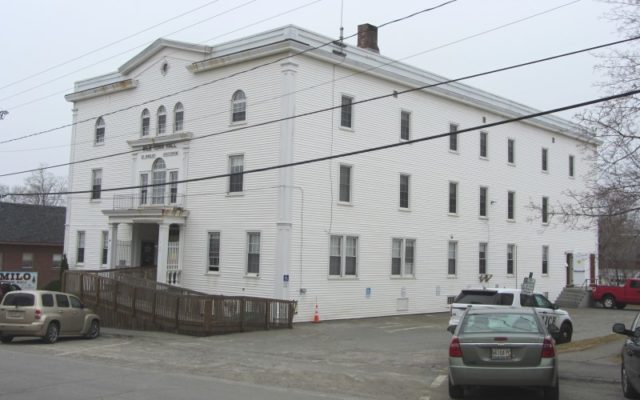
Penquis Recreation Department director hired
MILO — Late last year Milo and Brownville officials voted in favor of merging the two neighboring communities’ recreation departments into a new Penquis Recreation Program. Reasons cited included providing more opportunities for area youth and other residents and to potentially save money.
Leading the new program will be Crystal Cail, who has been formally hired as director as was announced by Milo Town Manager Bob Canney during a Jan. 8 select board meeting.
Canney said he and Brownville Town Manager Felice Lyford conducted the interviews with Cail — a former recreation director in Brownville — being chosen. Canney said Cail has given notice at her current job and she is a firefighter/EMT with Millinocket’s fire and rescue.
The town manager said he believes Cail will split days between Millinocket and the Penquis Recreation Department. Canney said Cail has applied to the Milo Fire Department where her EMS qualifications would be needed.
“We had two very good candidates, we had five or six applicants and the top two both easily could have done the job and we chose Crystal,” he said, saying her fire/rescue experience is a bonus.
Canney said Cail will have office space on the lower level of the town hall. They will discuss rec committee appointments soon after she starts.
During the December select meeting, Canney said the Penquis Recreation Program budget is being developed. He said the auditor recommends the full expenses be included in Milo’s finances and later Brownville’s proportional share will come in as revenue. Under the arrangement, the director would be a Milo town employee with the community covering insurance and benefits such as a cellphone stipend and mileage reimbursement.
To determine Penquis Recreation Program funding both school population and town censuses were looked at. In SAD 41 about 63 percent of students from the two towns are from Milo and 36 percent from Brownville while per the most recent U.S. Census the combined split is 68/32, so a halfway ratio of 65/35 was agreed upon.
Canney and Lyford have discussed how to fill the seats on the recreation committee, which could have three Milo positions and three from Brownville. Canney had said they would like to have a rec director in place to help with the screening process. There will likely be a sign-up sheet for those interested and candidates will also likely be able to email about their willingness to serve on the committee.
Select boards would approve a list of recommendations. Committee term lengths will need to be determined, with annual appointments a possibility.
In other business, Canney said earlier in the day he received an update from Plymouth Engineering on the forthcoming public safety building. He said USDA has some recommendations for a final review and the firm sent the paperwork back to await approval.
“We can break ground in 2025, it just depends on when,” Canney said. Once the paperwork is finalized then the project can go out to bid.
The town is currently in the planning stages of a new building to house the fire, police, and public works departments. The community can spend up to $6,375,000 in USDA funds for the public safety building, which will be located at the business park and across the road from the Milo Water District office less than a mile up Park Street from the 100-year-old town hall where the fire and police departments are currently located.
Plymouth Engineering had been meeting with town officials and department heads to design each department’s section of the facility, with plans being solidified. The engineering firm estimates the building, groundwork, and engineering costs to total $7,200,758 or $825,758 more than what Milo has available in project funding. To make up the difference, residents approved a line of credit not to exceed $825,758 to cover costs above and beyond the $6,375,000 at a special town meeting
The construction is expected to be an 18-month build.
The select board formally appointed Michael Harris, who had been assistant chief, as fire chief.
In his report Harris mentioned how Brownville is assisting Milo. “They have agreed to help us out with EMS calls due to a lack of EMS licenses in the department,” he said. “We usually only have one license in town and that’s a lot on one person to be committed to be around 24/7.”
Mentioning a recent string of 17 calls in eight days, Harris said ambulance coverage is an issue that needs to be addressed. He said various options are being looked at to ensure there are no gaps in coverage.
“As the fire chief I feel our No. 1 priority is to serve the community and take care of our residents,” Harris said.
“If we privatized the ambulance and took it over as the municipality it would cost us $800,000 to a $1 million-plus a year to do,” Canney said “So we send Three Rivers a little over $16,000 a year as a donation — that’s a hell of a bargain.”
Three Rivers Ambulance currently has a lack of employees to staff 24/7, part of a problem for EMS providers across Maine and the nation.
Canney said for the February meeting the select board will have some adult use marijuana options to consider prior to an upcoming public hearing concerning Milo’s ordinances.
Arthur Wilkins of the Economic Development Advisory Committee told town officials the group hopes to do more community engagement in the new year.
“The biggest current project is building a kind of business directory for the town,” he said.
“I would encourage people to come out to really collect community feedback at this point to find out what we can do,” Wilkins said,
Canney said the updated municipal website will include a space for the Economic Development Advisory Committee which the group will be able to manage.